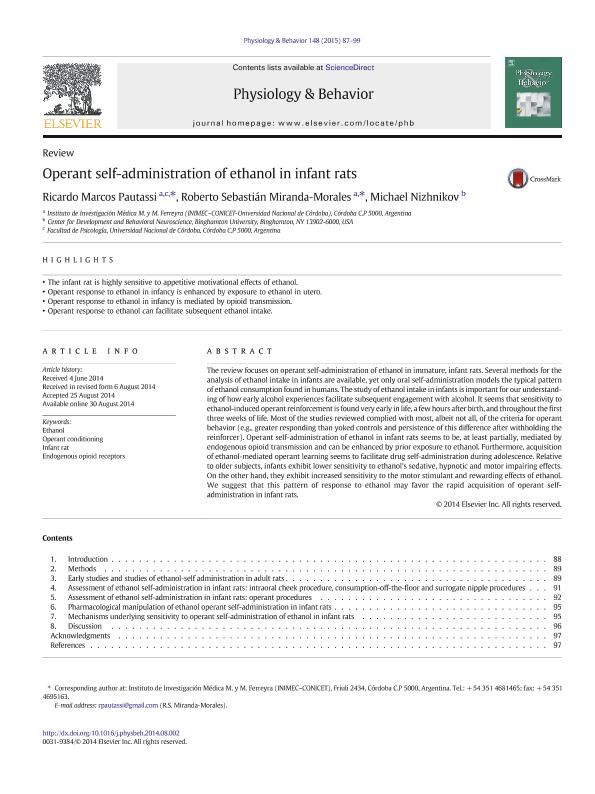Mostrar el registro sencillo del ítem
dc.contributor.author
Pautassi, Ricardo Marcos

dc.contributor.author
Miranda Morales, Roberto Sebastián

dc.contributor.author
Nizhnikov, Michael

dc.date.available
2023-01-26T12:52:14Z
dc.date.issued
2015-09-01
dc.identifier.citation
Pautassi, Ricardo Marcos; Miranda Morales, Roberto Sebastián; Nizhnikov, Michael; Operant self-administration of ethanol in infant rats; Pergamon-Elsevier Science Ltd; Physiology And Behavior; 148; 1-9-2015; 87-99
dc.identifier.issn
0031-9384
dc.identifier.uri
http://hdl.handle.net/11336/185721
dc.description.abstract
The review focuses on operant self-administration of ethanol in immature, infant rats. Several methods for the analysis of ethanol intake in infants are available, yet only oral self-administration models the typical pattern of ethanol consumption found in humans. The study of ethanol intake in infants is important for our understanding of how early alcohol experiences facilitate subsequent engagement with alcohol. It seems that sensitivity to ethanol-induced operant reinforcement is found very early in life, a few hours after birth, and throughout the first three weeks of life. Most of the studies reviewed complied with most, albeit not all, of the criteria for operant behavior (e.g., greater responding than yoked controls and persistence of this difference after withholding the reinforcer). Operant self-administration of ethanol in infant rats seems to be, at least partially, mediated by endogenous opioid transmission and can be enhanced by prior exposure to ethanol. Furthermore, acquisition of ethanol-mediated operant learning seems to facilitate drug self-administration during adolescence. Relative to older subjects, infants exhibit lower sensitivity to ethanol's sedative, hypnotic and motor impairing effects. On the other hand, they exhibit increased sensitivity to the motor stimulant and rewarding effects of ethanol. We suggest that this pattern of response to ethanol may favor the rapid acquisition of operant self-administration in infant rats.
dc.format
application/pdf
dc.language.iso
eng
dc.publisher
Pergamon-Elsevier Science Ltd

dc.rights
info:eu-repo/semantics/openAccess
dc.rights.uri
https://creativecommons.org/licenses/by-nc-sa/2.5/ar/
dc.subject
ENDOGENOUS OPIOID RECEPTORS
dc.subject
ETHANOL
dc.subject
INFANT RAT
dc.subject
OPERANT CONDITIONING
dc.subject.classification
Drogadicción

dc.subject.classification
Ciencias de la Salud

dc.subject.classification
CIENCIAS MÉDICAS Y DE LA SALUD

dc.title
Operant self-administration of ethanol in infant rats
dc.type
info:eu-repo/semantics/article
dc.type
info:ar-repo/semantics/artículo
dc.type
info:eu-repo/semantics/publishedVersion
dc.date.updated
2023-01-23T16:41:38Z
dc.identifier.eissn
1873-507X
dc.journal.volume
148
dc.journal.pagination
87-99
dc.journal.pais
Estados Unidos

dc.description.fil
Fil: Pautassi, Ricardo Marcos. Consejo Nacional de Investigaciones Científicas y Técnicas. Centro Científico Tecnológico Conicet - Córdoba. Instituto de Investigación Médica Mercedes y Martín Ferreyra. Universidad Nacional de Córdoba. Instituto de Investigación Médica Mercedes y Martín Ferreyra; Argentina
dc.description.fil
Fil: Miranda Morales, Roberto Sebastián. Consejo Nacional de Investigaciones Científicas y Técnicas. Centro Científico Tecnológico Conicet - Córdoba. Instituto de Investigación Médica Mercedes y Martín Ferreyra. Universidad Nacional de Córdoba. Instituto de Investigación Médica Mercedes y Martín Ferreyra; Argentina
dc.description.fil
Fil: Nizhnikov, Michael. University of Binghamton; Estados Unidos
dc.journal.title
Physiology And Behavior

dc.relation.alternativeid
info:eu-repo/semantics/altIdentifier/url/https://www.sciencedirect.com/science/article/pii/S003193841400448X?via%3Dihub
dc.relation.alternativeid
info:eu-repo/semantics/altIdentifier/doi/http://dx.doi.org/10.1016/j.physbeh.2014.08.002
Archivos asociados
